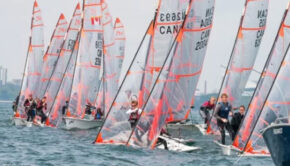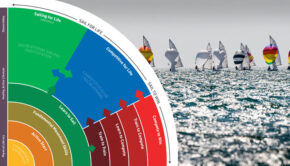Recognizing Canadian Offshore Success
Published on February 20th, 2019
The Gerry Roufs Award was established in 1998 by the Canadian Yachting Association to honour the memory of Gerry Roufs, the internationally renowned Canadian sailor and single-handed offshore racer who was lost at sea in 1997.
The award is presented to the person whose achievement in international offshore racing has had a significant impact on the recognition of sailing in Canada, with Simon Dubois selected as the newest recipient.
DuBois returned home to Sherbrooke in 2017 to launch the biggest project of his life: becoming the first Quebecer to sail in a non-professional race around the world. After a rigorous selection and training process, he was selected to be one of the sailors to compete in the 2017-18 Clipper Round the World Race on board Visit Seattle.
As one of the most demanding amateur sporting event, this race takes you across the globe. Divided into eight legs and 13 to 16 individual races, the 40,000nm course was divided into eight legs and 13 individual races with each crew having the option to choose if they want to complete the full circumnavigation or select individual legs. DuBois completed the entire circumnavigation totaling 335 days spent at sea.
The team on board Visit Seattle finished 2nd overall and won 3 separate race stages (Hobart-Withsundays, Sanya-Qingdao, and New York-Derry Londonderry). This was a dream come true for this sailor in which he was named Voile Québec’s 2018 Sailor of the Year Helly Hansen Sailor of the Month in December 2018.
Dubois offers his thoughts on the award and race:
How does it feel to have been selected as the recipient of the Gerry Roufs Trophy?
It still feels unreal, to be honest. When taking a look at the people who have won the Trophy before, I feel blessed to be part of such a select group. At first, when I decided to push my passion of sailing to the extreme and take on the Clipper Round the World Yacht Race challenge, I did not realize that no Quebecker had ever completed the challenge before.
I had met Canadians Eric Holden and Morgan Watson after their campaign, and they provided me with great advice. There are only a few Canadians in offshore sailing, and the few that do, do it well. It was an honour to pursue this Canadian legacy during the latest edition.
Since Gerry’s attempt, 20 years ago, no Quebecker had attempted to complete a sailing race around the world. I am proud to have gone all the way and to honor his memory. I hope that my adventure helped people realize that anyone can accomplish something extraordinary because that was the essence of it: I’m just an ordinary guy who decided to go after the extraordinary.
What would you say has been the largest contributing factor to your team’s level of success?
I think the biggest contributing factor to our success and our 2nd position overall was our desire for excellence. We were keen to constantly improve and get better day after day, race after race. We were also lucky to have Nikki Henderson as our skipper, who, in my opinion, was the best tactician of the fleet.
However, these boats can’t be sailed on their own. We, as a crew and as leaders onboard, had to step up and take charge. We were responsible for having each other’s back and transmit as much learning to one another as possible. Knowledge sharing was key to onboard new crew members and improving as a team leg after leg throughout the 11 months of the race.
What makes up a good team?
I am sure there are many recipes for that and for success. In my opinion and from what I experienced, it all starts from the top. Your leaders must lead by example and “walk the talk” because the way you act and react as a leader reflects on the people around you.
Winning is an outcome. The process of competing, learning, and adapting is what leads to the outcome. You must create an environment where people accept to leave their ego aside, and work for the best interests of the team. The best players don’t always make the best teams.
You also must create an environment where it is acceptable to fail and make mistakes because that’s where you learn and improve. It’s okay to fail, it’s not okay to not do anything about it. Finally, I strongly believe that in a larger group environment, diversity adds a lot of value. It creates a better and more stable environment which will make everybody perform better.
To prove it, we got our best results when we had a 50/50 ratio of women and men on board. It is also when we had the most fun. The environment is a key performance factor that is often forgotten. I’m happy and proud that the world of sailing has led the way to increase diversity in sports.
What is one piece of advice you could give to sailors towards navigating as a team?
Leave your ego on the dock and make it fun. Whether you agree with all decisions are not, there is a time to discuss and a time to deliver. Once a decision is reached, just go 100% with it and then learn from the outcome. When times are hard, try to make it fun.
Source: Sail Canada









 We’ll keep your information safe.
We’ll keep your information safe.